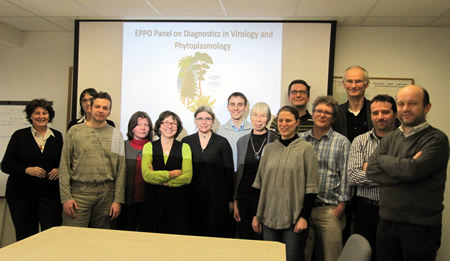
3rd Meeting of the Panel on Diagnostics in Virology
and Phytoplasmology
Rome, 2014-10-14/17
The Panel on Diagnostics in Virology and Phytoplasmology met in Rome at the kind invitation of Ms Barba. Altogether, 17 Diagnostic Protocols on viruses and phytoplasmas have now been approved and published. This short report highlights the main conclusions of the Panel.

New horizontal Standards for diagnostics
- A new Standard on ELISA tests for viruses was finalized and was considered to be ready for country consultation;
- A first draft for a generic Standard on the detection of pospiviroids was discussed and further work will be done by the Panel;
- A first proposal for a Standard on the Use of Electron Microscopy in Diagnostics for plant viruses was discussed. A group of experts has been organized to work further on the document. The Panel will finalize the document via email consultation with the objective to send it for country consultation in early 2015;
- The Panel agreed to wait for the finalization of the IPPC Protocol on Phytoplasmas before starting the preparation of a generic Standard for the detection of phytoplasmas.
Pest specific protocols
A new Standard on Andean potato latent virus and related tymoviruses is in preparation. A first draft was discussed and a new version will be prepared for the next meeting. The Panel also considered the following adopted Standards and whether they required revision:
- PM 7/079 Grapevine flavescence dorée phytoplasma: the Panel reviewed the results of the EUPHRESCO project GRAFDEPI on the validation of conventional and real-time PCR tests. Based on this review the Panel agreed on which tests should be included in the protocol. The revised version should be sent for country consultation in early 2015.
- PM 7/032 Plum pox virus: an initial draft revision, taking into consideration the IPPC protocol on this pest which was adopted in 2012, was briefly discussed. Further comments from the Panel will be collected and the EPPO Secretariat together with the lead author (Mr Cambra) will prepare a new version. The Panel will be consulted by email and the protocol should be sent for country consultation in spring 2015.
- PM 7/002 Tobacco ringspot virus: the tests to be included in the revision have been identified and a draft for revision will be prepared by March 2015.
- PM 7/034 Tomato spotted wilt tospovirus, Impatiens necrotic spot tospovirus and Watermelon silver mottle tospovirus: the Panel agreed that a revision integrating new molecular tests will be prepared for the next meeting. A drafting team was established. It was also suggested that a generic Standard for the detection of tospoviruses may also be prepared.
- PM 7/030 Beet necrotic yellow vein virus and PM 7/049 Tomato ringspot virus, the sections needing revision were identified. Revised protocols will be prepared for the next meeting.
- PM 7/033 Potato spindle tuber viroid. An IPPC protocol on this organism is in the final stage of development. The EPPO protocol will need to be aligned pending the finalisation of the IPCC Standard and the finalisation of the EPPO generic Standard on the detection of pospiviroids.
- PM 7/050 Tomato yellow leaf curl and Tomato mottle begomoviruses. The Panel decided to wait for the finalisation of the IPPC Standard before starting the revision of this protocol. The Panel also considered the idea of preparing a generic Standard on begomoviruses.
- PM7/006 Chrysanthemum stunt viroid. The Panel decided to wait for the finalisation of the generic Standard on the detection of pospiviroids before starting the revision of this protocol.
- The revision of EPPO Standards PM 7/062 Candidatus Phytoplasma mali and PM 7/063 Candidatus Phytoplasma pyri was proposed. These Standards will be combined into a single protocol taking into account the outcome of the EUPHRESCO project ‘Interlaboratory comparison and validation of detection methods for phytoplasmas of phytosanitary concern in European orchards’ (FRUITPHYTOINTERLAB).
- PM 7/81(1) Cucumber vein yellowing virus (Ipomovirus). The Panel agreed that a revision to update virus distribution and identification methods is needed.
Other topics
EUPHRESCO
The Euphresco projects on viruses, viroids and phytoplasmas were presented for the Panel members to explore synergies with the Panel activities. The EUPHRESCO projects discussed included:
- Detection and epidemiology of pospiviroids (DEP) and Assessment of the risk posed by ornamentals and tomato seeds infected by pospiviroids to tomato crops and evaluation of pospiviroid detection protocols for seed testing in tomato (DEP 2);
- Reference collection for regulated viruses and viroids;
- FRUITPHYTOINTERLAB;
- Epidemiological studies on reservoir hosts and potential vectors of Grapevine flavescence dorée (GFD) and validation of different diagnostic procedures for GFD (GRAFDEPI);
- APOPHYT;
- Grapevine flavescence doreé (FD);
- Epidemiology and diagnosis of potato phytoplasmas and Candidatus Liberibacter solanacearum' and their contribution to risk management (PHYLIB).
Project slides and available final reports for all Euphresco projects are available under Research projects / Portfolio of the EUPHRESCO website.
TESTA
A specific session took place in relation to the project Seed health: development of seed treatment methods, evidence for seed transmission and assessment of seed health (TESTA). Two presentations were made of the TESTA outcomes on generic DNA/RNA extractions methods and generic real-time PCR assays:
- Multiplex detection of pospiviroids, by Mr van der Vlugt from “Plant Research International” of Wageningen University (NL)
- Detection of pospiviroids on seeds of tomato and pepper, by Mr Koenraadt from Naktuinbouw
The next Panel meeting will be held in Paris, at the EPPO Headquarters in spring 2016.
